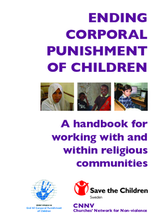This handbook aims to provide a useful tool and reference for all those engaging with and within religious communities and faith-based institutions and organisations to prohibit and eliminate corporal punishment of children. It may also be helpful for those who are in direct contact with children such as in children’s homes and welfare services, and religious schools including Sunday schools and madrassahs, as well as for those who influence policy and relations with children, for example in church congregations and organisations and as publishers of religious literature. It provides information, tools and resources which can be used to work in partnership with others, engage with religious leaders, mobilise support and encourage multi-religious and community collaboration towards the prohibition and elimination of all corporal punishment of children.
The handbook is based on the premises that the major world religions value and respect the human dignity of every person including children and that compassion, justice, equality and non-violence are claimed by most people of faith to be central to their religion. At the same time it recognises that there are those in most of the world’s religions who use their faith and sacred texts to justify corporal punishment of children, and most campaigns for legal reform encounter strong resistance from some religious communities and organisations. These are often highly organised, publicised and well-funded. Challenges presented by religious opposition and resistance to legal reform are discussed and suggestions given on how to deal with these.
©Save the Children (Sweden), Global Initiative to End all Corporal Punishment of Children, Churchesâ Network for Non-Violence

